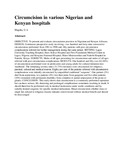| dc.contributor.author | Magoha, G A | |
| dc.date.accessioned | 2013-02-24T09:16:09Z | |
| dc.date.issued | 1999-10 | |
| dc.identifier.citation | East Afr Med J. 1999 Oct;76(10):583-6. | en |
| dc.identifier.uri | http://erepository.uonbi.ac.ke:8080/xmlui/handle/123456789/10950 | |
| dc.identifier.uri | http://www.ncbi.nlm.nih.gov/pubmed/10734511 | |
| dc.description.abstract | Objective:
To present and evaluate circumcision practices in Nigerian and Kenyan Africans.
Design:
Continuous prospective study involving:- two hundred and forty-nine consecutive circumcisions performed from 1981 to 1998 and; fifty patients with post circumcision complications referred for further management during the same period.
Setting:
Lagos University Teaching Hospital, Duro-Soleye Hospital and First Foundation Medical Centre in Lagos, Nigeria; and Kenyatta National Hospital, Mater Misericordiae and Nairobi Hospital in Nairobi, Kenya.
Subjects:
Males of all ages presenting for circumcision and males of all ages referred with post circumcision complications.
Results:
One hundred and fifty-two (61.04%) of circumcisions performed were in adolescents and young adults for cultural initiation into 'manhood'. The remaining seventy-nine (31.73%) neonates were circumcised for religious, parental, cultural and medical reasons. Eighty per cent of the patients referred with circumcision complications were initially circumcised by unqualified traditional "surgeons". One patient (2%) died from septicaemia; two patients (4%) lost their penis from gangrene and five other patients (10%) remained with permanent disability from complete or partial amputation of the penis or glans.
Conclusion:
This study shows that circumcision is a commonly performed operation but can have serious, life shattering and prolonged complications sometimes resulting in death. It should therefore be performed only in medical institutions under sterile conditions and by suitably trained surgeons for specific medical indications. Ritual circumcision whether mass or single for cultural or religious reasons remains controversial without medical benefit and should be discouraged. | en |
| dc.language.iso | en | en |
| dc.subject | Circumcision | en |
| dc.title | Circumcision in various Nigerian and Kenyan hospitals | en |
| dc.type | Article | en |
| local.publisher | Department of Surgery, College of Health Sciences, University of Nairobi, Kenya | en |

